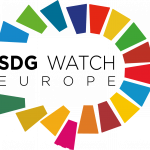The recently published Commission Communication, 22 November 2016 – “Next steps for a sustainable European future contains a reference to the EU’s intention to establish a Multi-Stakeholder Platform as part of its overall implementation of the SDGs. As a broad cross-sectoral civil society alliance, SDG Watch Europe welcomes this announcement.
The forum proposed, if organised appropriately, would amount to the operationalisation of Agenda 2030’s commitment to a multi-stakeholder approach as a key means of implementation.The forum should involve key stakeholders including civil society, the private sector, academia and others.
For this reason, SDG Watch Europe consulted with its members and subsequently sent the following letter to the First Vice President of the Commission, Frans Timmermans. The letter sets out the priorities of our alliance in relation to any multi-stakeholder platform that is to be established as part of the overall implementation of the SDGs by the EU The letter can be viewed below.

Dear First Vice President Timmermans,
SDG Watch Europe welcomes the initiative of the European Commission to establish a Multi-Stakeholder Sustainable Development Platform. We assume that European civil society will be actively involved in this endeavour from the early planning phases, and are happy to co-operate.
We believe that for a cooperative, multi-stakeholder process to be effective, the various stakeholders need to be involved in its development from the outset. This approach builds strong and positive relationships and adds credibility to the process. It is also fully in keeping with the spirit of the SDGs. We would like to share with you a number of principles outlined below that we believe need to inform the design and operation of any EU Multi-Stakeholder platform which the members of SDG Watch Europe would be happy to join.
In this regard, we would like to reference the EESC opinion on “A European Sustainable Development Civil Society Forum” (Aug 2016), where similar principles are reflected. We would like to give the planning and development of this EU Multi-Stakeholder Platform the time and consideration needed in order to have a successful outcome.
We have been informed that relevant announcements might already be made at the Commission’s conference on December 20th. Therefore we would like to request that you consider SDG Watch Europe’s offer to contribute to the process from this point onwards. We would welcome an opportunity to meet with you at your earliest convenience to discuss this important issue.
The principles are as follows:
Planning
-
Civil society organisations (CSOs) must be involved from the very outset in any discussions on the design and organisation of the new EU Multi-Stakeholder Platform for Sustainable Development.
Governance
-
In order to ensure the independence, credibility and legitimacy of the Platform, the role of EU institutions involved must be ‘facilitating’ the Platform’s activities.
-
The governance arrangements agreed for the Platform must ensure the equal standing of civil society with all other stakeholders, and equal opportunities to be involved in all of the platform’s structures and activities.
Composition
-
The stakeholder’s groups represented on the platform must include representatives of the nine Major Group and Other Stakeholders system of the UN, covering in a balanced way all the dimensions of Sustainable Development.
-
The stakeholder groups must have responsibility for choosing their own representatives to participate in the platform, based on a ‘self-organising’ principle.
Resourcing
-
The continuous participation of the stakeholders in the platform must be resourced by the Commission, to enable them to realise the policy work, and the consultation and communication with their constituencies.
-
The structure of the platform must be institutionalised and a secretariat fully resourced to ensure effective and two-way communication with all stakeholders.
Functioning
-
The work programme of the platform must follow a predictable annual cycle and involve ongoing activities throughout the year to which different stakeholders can be invited.
-
There must be clear and active links established between the activities of this platform and similar forums and processes functioning at EU Member State level.
-
All stakeholders must have equal and timely access to information relevant to the platform’s functions and activities.
-
All stakeholders must have an equal role in agenda setting within the platform.
-
Transparent processes must be put in place within the platform for developing agreed joint positions (where necessary).
-
The Agenda 2030 principle of “Leave No One Behind” must be operationalised by the platform by including marginalised groups in its structures and activities.
-
The principle of “Policy Coherence for Sustainable Development” must be central to the way in which the platform organises itself and its work.
-
An evaluation of the overall functioning and the effectiveness of the platform, and involving all stakeholders, must take place at agreed intervals.
Impact
-
Credible mechanisms must be established to ensure that the recommendations of the platform will influence the policy and decision-making processes of the Commission and the other EU institutions.

